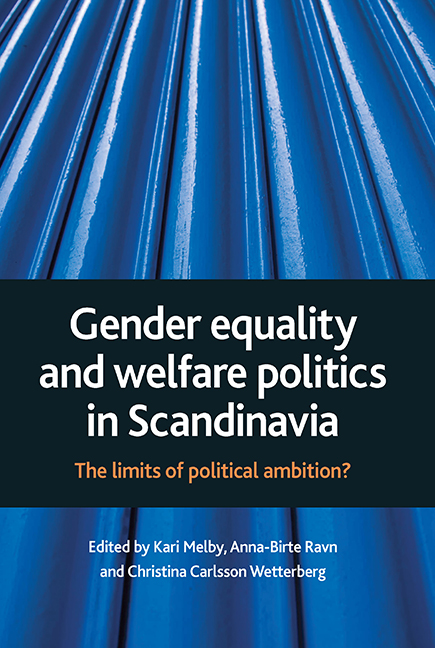Book contents
- Frontmatter
- Contents
- List of tables
- Preface
- Notes on contributors
- A Nordic model of gender equality? Introduction
- Part One Meanings of gender equality in Scandinavian welfare policy
- Part Two Current challenges: competing discourses on gender equality
- Postscript Gender, citizenship and social justice in the Nordic welfare states: a view from the outside
- Postscript Future research on gender equality in the Scandinavian countries
- Appendix Tables 1-10
- Index
five - Academic discourse, social policy and the construction of new families
Published online by Cambridge University Press: 21 January 2022
- Frontmatter
- Contents
- List of tables
- Preface
- Notes on contributors
- A Nordic model of gender equality? Introduction
- Part One Meanings of gender equality in Scandinavian welfare policy
- Part Two Current challenges: competing discourses on gender equality
- Postscript Gender, citizenship and social justice in the Nordic welfare states: a view from the outside
- Postscript Future research on gender equality in the Scandinavian countries
- Appendix Tables 1-10
- Index
Summary
Introduction
From the late 1960s, Swedish family and gender equality politics has strongly emphasised individualised marriage ties, autonomy and economic independence. The explicit political objective has been to construct institutional means for creating a society ‘where every adult individual takes responsibility for herself or himself, without being dependent on other family members’ (SOU 1972:41, p 58). Family law has been reformed accordingly, and social rights and entitlements have increasingly become tied to the individual. This institutionalised individualism (cf Beck and Beck-Gernsheim, 2002, p 23) has promoted processes of individualisation and defamilialisation (cf Orloff, 1993; Lister, 2003). The aim of the present chapter is to shed some light on the discursive framework that has shaped this policy. To be more precise, I discuss issues specifically dealing with gender relations, and in particular questions concerning economic independence, paid work, childcare and fatherhood. Focus is on the interplay between academic discourse and political regulations of family structure and gender relations, the assumption being that the social sciences have played an important mediating role between the so-called sex-role movements and the women's movements on the one hand, and the Swedish welfare state, on the other hand. Using Nancy Fraser's concept of ‘bridge discourse’, it is proposed that sociology and gender studies in particular have taken on this role. In addition, it is suggested that the juridical discourse has functioned as a bridge discourse for groups of men claiming rights to child custody after divorce.
The chapter is organised in the following way. A brief presentation of Nancy Fraser's theory of need struggles in welfare states follows this introduction. The section includes a short discussion about the empirical material. The three subsequent sections contain the empirical analysis. The first of these focuses on the political discourse on family and gender relations in Sweden in the 1970s. I describe the discursive shift that took place and argue that the social sciences, and in particular sex-role theory, played an important role in this process. The section that follows argues that a second discursive shift took place in the 1980s when the concept of ‘sex roles’ to an increasing extent was replaced by conceptions emphasising power relations between genders.
- Type
- Chapter
- Information
- Gender Equality and Welfare Politics in ScandinaviaThe Limits of Political Ambition?, pp. 101 - 116Publisher: Bristol University PressPrint publication year: 2008
- 1
- Cited by



